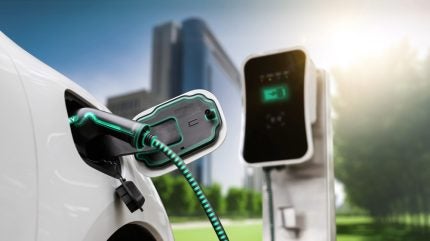
Charging infrastructure for BEVs and the extent to which slow rollout may be inhibiting market growth is a big talking point in the UK. In a guest post exclusively for Just Auto, Vendigital’s Sheena Patel takes a closer look at the issue.

Scepticism about charging infrastructure remains a key barrier to the UK’s EV transition and whilst there are signs that more investment is on the way, it can’t come quickly enough for UK-based manufacturers. In the meantime, some agile entrants offering alternative charging solutions are primed and ready to step into the space. So how should UK-based EV makers respond?
The issue of range anxiety, which is linked to a lack of charging infrastructure, hasn’t gone away. Many consumers lack confidence that sufficient infrastructure will be provided to facilitate a smooth transition to all-electric vehicles by the Government’s 2030 deadline, when the sale of new petrol and diesel engine cars is to be banned. Whilst scepticism is holding back the pace of the transition, the latest data from the Society of Motor Manufacturers and Traders (SMMT) confirms that the market is growing strongly, with battery-electric vehicles (BEVs) accounting for 24.8% of the new car market in June.
The state of UK EV infrastructure
Despite healthy growth in demand for EVs, the current state of infrastructure readiness to support the UK’s transition can be summarised as not enough, uneven and too slow. There are currently about 1.3 million EVs on the road in the UK and about 82,000 public charging points to support their use. Whilst this ratio – 16:1 – is on a par with other key markets, such as the EU and the US, China is already at 7:1 (although opportunities for private home charging are more limited).
The availability of public charging infrastructure is not spread evenly either, with metropolitan areas, such as London, benefiting from more infrastructure investment, whilst rural areas and regional towns are missing out. This lack of evenness is perpetuating range anxiety for some consumers, as national travel is less feasible without advance planning.
The time it takes to fully charge a BEV is another important issue for consumers and commercial users alike. Most EV chargers installed in the UK are Type 2, providing up to 22kW fast charging, so it takes 3-4 hours to fully charge a Nissan Leaf. The availability of such charging infrastructure is improving, with 2,227 rapid or ultra-rapid charge points recently added to the UK public network. BYD is also planning to install new ultra-fast, 1,000kW “flash chargers” in the UK in 2026, according to the RAC, offering charging speeds significantly faster than current systems.
Practical hurdles to overcome
As the scale and availability of faster charging options improves, more consumers and commercial fleet managers could be encouraged to switch to fully electric vehicles, but this could take time.
Charge point operators (CPOs) are facing significant challenges in finding suitable sites, securing the permissions needed to build a new public charging facility and ensuring its integration with existing power grid infrastructure. The upfront capital costs required to purchase land and install the necessary equipment, and the on costs associated with maintaining it, without a bank of historic use data to underpin investment decisions, mean there is significant commercial risk involved.
As part of its UK infrastructure: A 10 year strategy, published alongside the UK Industrial Strategy in June, the UK Government has pledged to invest a further £400 million in EV charging infrastructure. However, we will have to wait for the detail to find out how this funding will be spent. In July, it was confirmed that £63 million of new investment in EV infrastructure will be allocated to for cross-pavement charging initiatives and improved signage for existing facilities. Whilst these pledges and investments will make a difference, it is clear that more dedicated support for CPOs may yet be needed.
Key to accelerating the UK’s EV transition is ensuring that charging infrastructure is widely available, and there also needs to be greater focus on standardisation to facilitate the universal charging of batteries, regardless of EV maker. Greater focus on industry collaboration is needed, involving OEMs, CPOs and policy makers. In particular, sharing usage data could help to mitigate risk and drive investment in new charging stations. Issues with grid capacity will also need to be addressed.
Opportunities for agile new entrants
With so many hurdles to overcome, there is a window of opportunity for agile, tech-led entrants to introduce their own innovative solutions and gain a foothold in an expanding market.
For example, the world’s largest maker of EV batteries, CATL, has recently confirmed plans to bring its battery-swapping and recycling technologies to the UK and Europe. As it takes just four minutes to swap an EV battery, compared to 15 minutes to charge one (using ultra-fast charging technologies), the advantages could be particularly important for commercial users looking to minimise vehicle downtime. For consumers, battery swapping services could facilitate a lower ticket price, as they would no longer have to own the battery inside the EV, which is the most expensive part of the vehicle. Battery swapping services are already available in the EU, for example, Nio recently opened its 60th European swap station in Sankt Augustin, Germany. Other novel service-based solutions available in the UK include Siemens’ Depot360 – a Charging-as-a-Service model designed for fleet operators, allowing them to optimise the management of vehicle charging across their entire fleet. At a time of growing concern about battery supply chains, due to geopolitical tensions and growing global demand for EVs, such charging alternatives could gain traction in the future.
Calls to collaborate
For OEMs, exploring opportunities for strategic collaborations with players in the aftermarket sector is critical to a successful EV transition. Partnering with CPOs and providers of alternative solutions could help to drive sales of new all-electric models at a critical time in the market’s development and allow time for infrastructure gaps to be addressed. Greater collaboration could also encourage data sharing and speed the way to standardisation; ensuring that the charging solutions of the future are compatible with all UK-made EVs bringing benefits for users and makers alike.
Sheena Patel is an automotive sector specialist at Vendigital.







